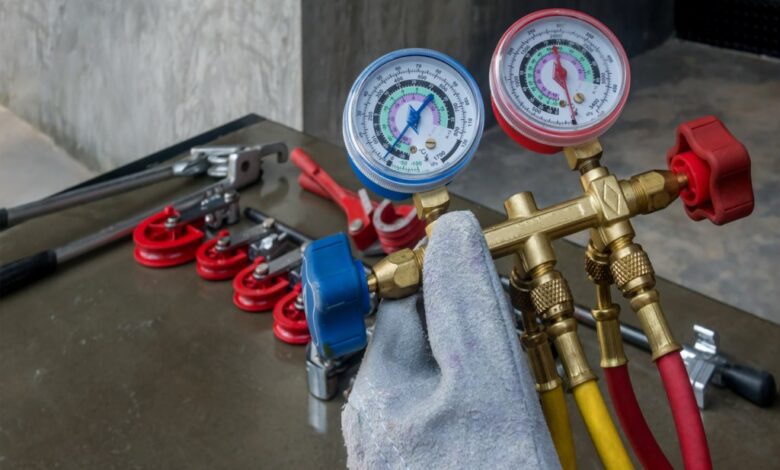How Much Gas Should Be In 1.5-Ton AC?

Air conditioning is an essential component of modern life, especially in regions with sweltering summers. When it comes to cooling systems, the size and efficiency of an air conditioner play a crucial role in ensuring optimal performance. One significant factor that determines the efficiency and effectiveness of an AC unit is the appropriate amount of refrigerant gas present within it. In this article, we will delve into the specifics of how much gas should be in a 1.5-ton AC unit to ensure its smooth operation and provide insights into why this aspect is vital for maintaining comfortable indoor temperatures during scorching hot days. Whether you are a homeowner in Rapids or seeking rapids mn furnace repair coon, understanding the optimal gas level for your air conditioning system is crucial for its efficient functioning and longevity.
The Role Of Gas In An AC System
The role of gas in an AC system is crucial for its functioning. The gas, commonly known as refrigerant, plays a significant role in absorbing heat from the indoor air and transferring it outside. Without an adequate amount of gas, the AC system will not be able to cool down the room effectively.
In a 1.5-ton AC unit, the ideal amount of gas required is typically around 2-3 pounds or approximately 0.9-1.4 kilograms. This quantity ensures efficient cooling and proper functioning of the system. However, it is essential to note that adding too much or too little refrigerant can negatively impact the AC’s performance and efficiency.
Regular maintenance and periodic checks are necessary to ensure that there is an appropriate amount of gas in the AC system. If you suspect any issues with your AC’s cooling capacity or notice a decrease in its efficiency, it is advisable to contact a professional technician who can accurately assess and refill the necessary amount of refrigerant for optimal performance.
Factors Affecting The Amount Of Gas Needed
Factors affecting the amount of gas needed for a 1.5-ton AC unit can vary depending on several key factors.
- Firstly, the size and efficiency of the air conditioning unit itself play a significant role. A larger unit may require more gas to adequately cool a space, while a more efficient unit may need less gas to achieve the same cooling effect.
- Additionally, the insulation and overall energy efficiency of the area being cooled can impact how much gas is needed. A poorly insulated space with drafts and leaks will require more gas to compensate for the heat loss, whereas a well-insulated space will retain cool air better and require less gas.
- Lastly, climate conditions can also affect the amount of gas needed. In hotter climates with higher temperatures and humidity levels, an AC unit may need more refrigerant to effectively cool down the air compared to cooler climates where less refrigerant would suffice.
Considering these factors is crucial in determining the appropriate amount of gas required for a 1.5-ton AC unit, ensuring optimal performance and energy efficiency while providing comfortable indoor temperatures.
How To Determine The Ideal Gas Level
One of the most important factors in determining the ideal gas level for a 1.5-ton AC unit is to consider the manufacturer’s specifications. Each AC unit comes with specific guidelines regarding the amount of gas it should hold. These specifications are usually provided by the manufacturer and can be found in the owner’s manual or on their website. Following these guidelines ensures that the AC operates efficiently and effectively. All Climate Mechanical is a renowned name in the world of heating and cooling solutions, providing top-notch services to countless households. Another way to determine the ideal gas level is by monitoring system performance. If you notice a decrease in cooling capacity or if your AC unit is not running as efficiently as it used to, it may be a sign that there is an issue with the gas level. In such cases, it is recommended to call a professional HVAC technician who can assess and adjust the gas level accordingly.
Regular maintenance checks also play a crucial role in determining and maintaining the ideal gas level of an AC unit. HVAC technicians can use specialized tools and equipment to measure and adjust the gas levels accurately, ensuring optimal performance and energy efficiency of your 1.5-ton AC unit.
Conclusion:
In conclusion, regular maintenance is of utmost importance for the efficient cooling of an air conditioning system. By neglecting this crucial aspect, homeowners may face a wide range of issues such as poor airflow, increased energy consumption, and ultimately reduced cooling efficiency. To ensure optimal performance, it is recommended to schedule routine maintenance checks with a professional technician.
One key area that requires regular attention is the refrigerant level. In the case of a 1.5-ton AC unit, it should ideally have around 4-6 pounds of refrigerant gas to operate efficiently. A lower amount can result in inadequate cooling capacity while an excess can lead to decreased system efficiency and potential damage. Therefore, homeowners must pay close attention to the refrigerant levels and have them checked regularly during maintenance visits.
Moreover, regular maintenance also allows for the timely identification and resolution of any underlying issues that may hinder the cooling process. This includes cleaning or replacing air filters, inspecting ductwork for any leaks or blockages, checking electrical connections for faults or loose wires, and ensuring the proper functioning of all components like condenser coils and fans. By addressing these problems proactively through regular maintenance services, homeowners can enjoy cooler temperatures while minimizing energy costs and prolonging the lifespan of their AC units.



